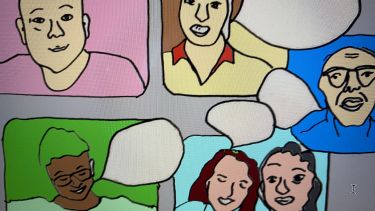Collaborative inquiry
Putting disabled people front and centre of research culture inquiry

University researchers: Sophie Phillips and Dan Goodley
Project Partners: Sheffield Voices
This Priority Area of WAARC is split into two areas of work.
Enhancing university research culture through research with Disabled People's Organisations
Problem: A need to promote more inclusive disability research activity at the University of Sheffield in Collaboration with Disabled People's Organisations.
Strategic Plan: We led and managed an Open Call to all researchers in the university encouraging them to apply for research funds to implement a research project in collaboration with Disabled People's Organisations.
Deliverables:
- Four Collaborative Projects were funded that seek to address the research priorities of disabled people and their representative organisations.
- A Faculty of Social Sciences Working Group Working with University systems and Complex Research Grants identified recommendations for smoothing the bureaucratic and administrative processes of engaging key non-academic partners in collaborative research including simplified contracts; writing in the contracts pipeline into grant applications; sharing stories of successful collaboration; properly remunerating non-academic partners for research.
Cripping the Concordat: Supporting the career development of disabled researchers
Problem: A disconnect between current commitments around researcher development and the barriers faced by disabled researchers.
Strategic plan: Explore how the Concordat To Support the Career Development of Researchers can more effectively support the needs and research aspirations of disabled researchers.
Deliverables:
- Cripping the Concordat Game event was held in October 2025 with Postgraduate, and Early Career Researchers.
- A documentary analysis of the Concordat revealed key development disabled researchers. The WAARC team are collaborating with the Critical Disability Studies community on a series of creative workshops that crip the concordat.
The outputs will include a set of resources and recommendations arising from the open call projects and further guidance on enhancing the Concordat. The evaluation will include an assessment of the outcomes of the open call projects and a framework for assessing the impact of enhanced guidance aligned with the Concordat on disabled researchers.

iHuman
How we understand being ‘human’ differs between disciplines and has changed radically over time. We are living in an age marked by rapid growth in knowledge about the human body and brain, and new technologies with the potential to change them.
